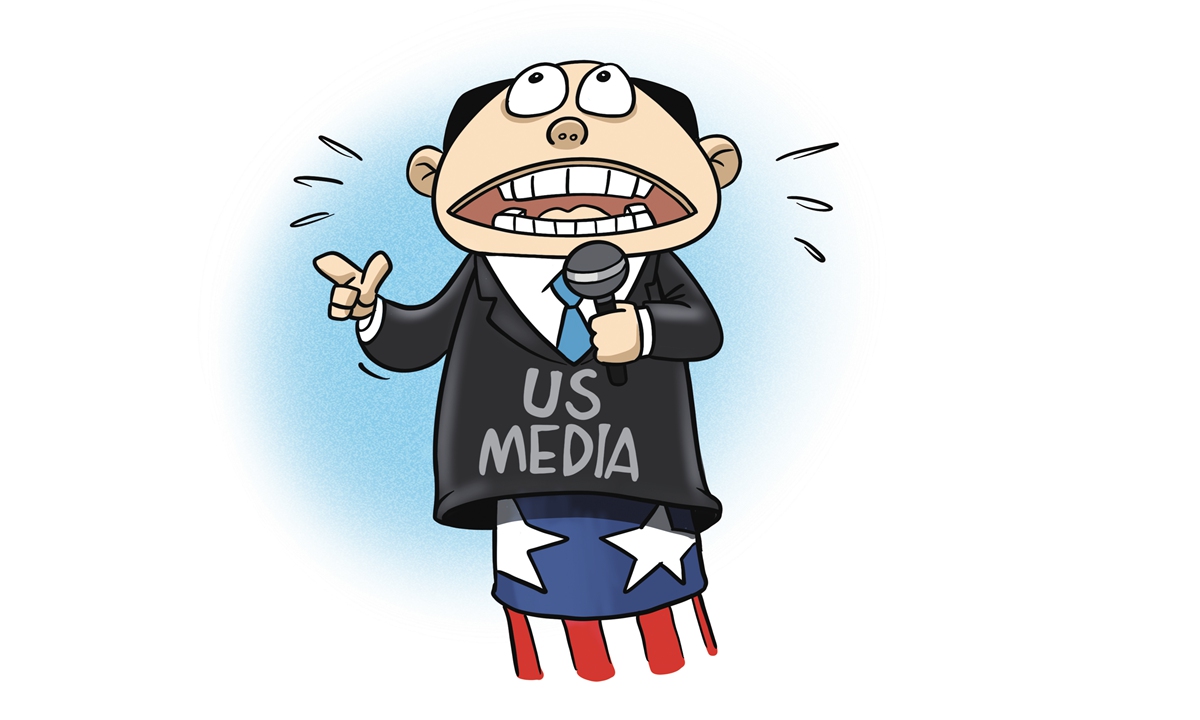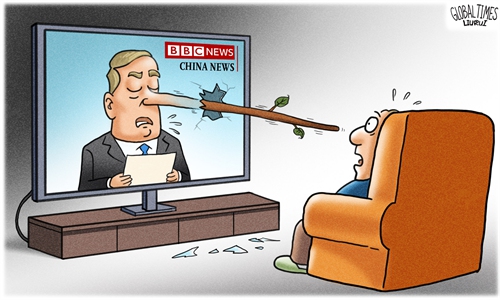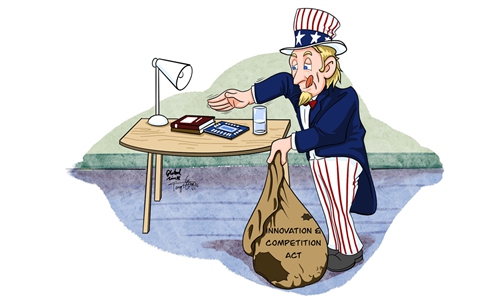
Illustration: Liu Rui/GT
Why does the US, the world's only superpower today, seem paranoid whenever it comes to China-related issues? How has this anti-China atmosphere prevailed in the US and other Western countries? German writer Michael Lueders, in his new book The Hypocritical Superpower, exposes in detail the US media's reporting tricks.Lueders depicted the US' whole industry chain to create rumors and smear other countries: Set the prerequisite that a country is problematic; the US government makes a statement against other countries, elites hype it and then US media interview government officials for confirmation - a seemingly balanced report and yet still predetermined; hire public relations company to produce baseless statements; intensify conflicts after the hype; spread the inflammatory information across borders.
The US is much too familiar with this whole process. For example, according to Politico, a US-based political communications firm O'Donnell & Associates created a document in April 2020 that urged the Republican Party to blame China with the statements such as "China caused this pandemic by covering it up, lying, and hoarding the world's supply of medical equipment," and "China is an adversary that has stolen millions of American jobs, sent fentanyl to the United States, and they send religious minorities to concentration camps." These statements have been frantically spread by US politicians and major media, starting a US public opinion offensive to discredit China in an all-round way.
Another example is the tracking of the COVID-19 origins. Again, Washington resorts to the above-mentioned process to smear China. Baseless disinformation has been used by the so-called experts, hyped by media, and emphasized by politicians. They are trying to turn the "lab-leak" conspiracy into a so-called scientific conclusion and international consensus.
This set of methods can also be traced back 19 years ago when former US president George W. Bush's administration fabricated the "washing powder" lie, to legitimize the US invasion of Iraq. Washington presumed guilt against Iraq after 9/11 and made up allegations that Iraq had a link with al Qaeda. In 2003, the then US secretary of state Colin Powell insisted that Iraq possessed weapons of mass destruction (WMD) and presented some white powder as proof at the UN, which was later mocked as "washing powder." Then, US officials distorted the narrative, deliberately exaggerated Iraq's WMD threat, agitated American people and ganged up US allies, including the UK and Australia, to join Washington in the invasion.
By repeatedly resorting to this industry chain of producing rumors, the US aims at fooling the world and manipulating the international community for the sake of its selfish interests. Mainstream US media has also played an infamous role in this chain. Although US media boasts of being "the fourth estate," they have become an accomplice of the US administration's suppression of China and other countries they regard as "opponents."
In an interview with the Xinhua News Agency in June, Lueders said some reports tend to simplify the complicated geopolitical issues into a combat between "we Western allies the good guys" against China and Russia "the evil ones." "This, in my view, is a wrong thinking. It's a dangerous thinking because it leads to a confrontational policy," he said.
In many US and Western speeches about China, there is very few objective discussion or criticism, but much blind demonization. The US and other Western countries are caught in a certain kind of predicament: They cannot jump out of the existing black-and-white mentality. They believe a country either represents "democracy" or "autocracy." Such a narrative will inevitably lead to the image of an unfree or an oppressed China.
"US anti-China propaganda has led many other Western countries by the nose. Worse, many Western people have believed such lies, and this may push the US and Western governments' China policies into an abyss, further worsening China-US relations and China-West relations and even making them irreparable," Zhang Tengjun, an assistant research fellow at the China Institute of International Studies, told the Global Times on Tuesday.
The world needs more diversified voices besides the US. Countries worldwide should get rid of Western media's stereotypes, re-understand China, and, as Lueders said, "step out of the shadow of the USA."
The author is a reporter with the Global Times. opinion@globaltimes.com.cn



